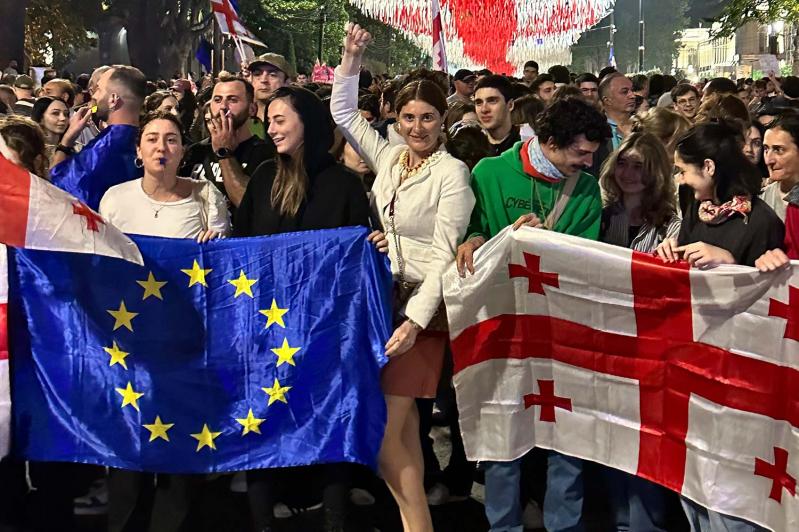It seems everywhere you look on a map, the world is in upheaval: Russia and Ukraine are deep into year two of their ongoing war; for almost nine months Gaza City has been inundated by Israeli forces after the Oct. 7 Hamas attacks in Israel, and in the country of Georgia, citizens are standing up to the government in the wake of a new law they feel runs counter to democracy.
At the center of the conflict in Georgia is an Amagansett woman, Tsisnami (Sissy) Sakvarlishvili, who has been a leader and organizer of protests for democracy and has even landed in court, facing sanctions for her work.
Since April, the sweeping protests have largely taken place in front of the Georgian Parliament building. The catalyst was the passage of a bill called “The Law on Transparency and Foreign Interest,” also known as the “Foreign Agents Bill.” According to Human Rights Watch, “the bill requires nongovernmental groups and print, online, and broadcast media that receive 20 percent or more of their annual revenue from a ‘foreign power’ to register with the Ministry of Justice.” This would include foreign-funded media and groups that criticize the government or support L.G.B.T.Q.+ issues, as well as non-governmental organizations.
The protests began because of the actions of the majority Georgian Dream Party that at present has control of Parliament. While many younger Georgians would like to see the country become a part of the European Union, the Georgian Parliament took a big step back by passing the controversial Law on Transparency and Foreign Interest. The E.U. has made it clear that such a law would impede Georgia from joining. On May 18, Georgian President Salome Zourabichvili vetoed the bill; however, because the Georgian Dream Party and Prime Minister Irakli Kobakhidze control parliament, they were able to override the veto on May 28 and it became law on June 3.
In a May 23 statement criticizing the bill, United States Secretary of State Antony Blinken said, “We
have seen clear indications of a campaign of intimidation and the use of violence to suppress peaceful dissent.”
Ms. Sakvarlishvili and other protesters argue the conservative and pro-Russian majority party will use this law to crush progressive ideals. “We are in a war in Georgia for our democracy,” she said. “They are attacking our values, our freedom, and our democracy.”
In multiple phone calls between May 29 and last Thursday, and navigating an eight-hour time difference, Ms. Sakvarlishvili described witnessing the government’s retaliatory actions. She has observed rubber bullets, fire hoses, and excessive force being used against protesters.
“They shoot the bullets and they used gas that burns your eyes,” Ms. Sakvarlishvili said. “I have been so lucky, but [the gas] was always in the air.” She has breathed in the lingering gases, blaming them for the feeling of sickness she has had.
“We are at war with empty hands,” Ms. Sakvarlishvili said. “What is our life if we are not free and our country doesn’t have freedom and democracy?”
In addition to the violence, she said she has witnessed or been told of several of her fellow activists being beaten in the streets. “One of our friends, the government people attacked him,” she said. “He has a broken arm.” She said she is also “receiving threatening calls telling me to go back to the U.S.”
For its part, the United States has begun to issue sanctions against many members of the Georgian Dream Party, with more potentially on the way. In a June 6 briefing, Matthew Miller, a State Department spokesman, said, “It remains our hope that Georgia’s leaders will reconsider their actions and take steps to move forward with their nation’s long-stated democratic and Euro-Atlantic aspirations. But if they do not, the United States is prepared to take additional actions.”
Because of her involvement, on June 15 Ms. Sakvarlishvili appeared in a Georgian court. “I received a letter from the police informing me that I have to go to court,” Ms. Sakvarlishvili said, saying that she was not arrested, but rather that she is being targeted. “I am in the front line all the time,” she said.
As a leader of the protests, she was fined 5,000 Lari, or $1,760.76 in U.S. currency. Protesters who were not designated as leaders also appeared in court with her; they were fined 500 Lari, or $176.08.
Ms. Sakvarlishvili plans to return to Amagansett in mid-July, but she says she will still be “very connected and will be back [in Georgia] in September.”
The fight is ongoing, and the stakes are high, she said. “I am a little bit concerned, but not scared. I really want my country to be independent and a part of the European Union.”




